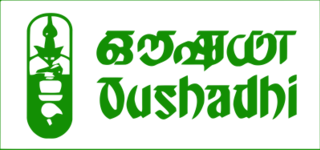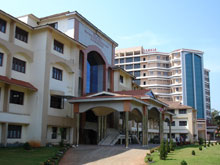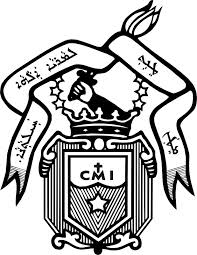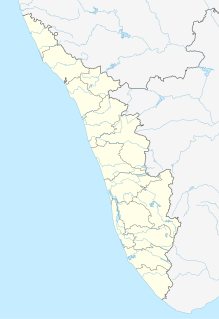
Ayurveda is a system of medicine with historical roots in the Indian subcontinent. Globalized and modernized practices derived from Ayurveda traditions are a type of alternative medicine. In countries beyond India, Ayurveda therapies and practices have been integrated in general wellness applications and in some cases in medical use.
Rasāyana, रसायन is a Sanskrit word, with the literal meaning: Path (āyana) of essence (rasa). It is a term that in early ayurvedic medicine means the science of lengthening lifespan, and in later works sometimes refers to Indian alchemy.

Dhanvantari is the Hindu god of medicine and an avatar of Lord Vishnu. He is mentioned in the Puranas as the god of Ayurveda. He, during the Samudramanthan arose from the Ocean of Milk with the nectar of immortality. It is common practice in Hinduism for worshipers to pray to Dhanvantari seeking his blessings for sound health for themselves and/or others, especially on Dhanteras or Dhanwantari Trayodashi. The Indian Government has declared that Dhanwantari Trayodashii Kumara every year would be celebrated as "National Ayurveda Day".
Sophie Emma Magdalene Grieve known as Maud. was a herbalist, plants woman and writer.

Oushadhi or Pharmaceutical Corporation Kerala Ltd is an Ayurvedic medicine manufacturing company situated in Kuttanellur, in Thrissur City of Kerala state. It is a 100% Government of Kerala owned company and produces around 450 ayurvedic formulations.
Sitaram Ayurveda Pharmacy Ltd is a public company which manufactures ayurvedic medicines in Thrissur City of Kerala State. It is the first ayurvedic company in India to get Good Manufacturing Practice (GMP) Certificate for its production facility in Thrissur City.
Eledath Thaikkattu Narayanan Mooss a.k.a. E. T. Narayanan Mooss is an Ayurvedic physician and the Chief Physician and Managing Partner of Vaidyaratnam Oushadhasala. He was awarded the Padma Bhushan in 2010 for his contribution to the field of medicine specific to Ayurveda.
Brahmavarchas Shodh Sansthan, or Brahmavarchas Research Institute, is a research centre situated on the bank of the Ganges, about half a kilometer from Shantikunj, Haridwar, in India. Equipped with a state of the art laboratory, a library and a botanical garden containing rare ayurvedic herbs, the institute is working on unique projects such as Yagyopathy, Ayurveda and Vedic mantras.
National Research Institute for Panchakarma (NRIP) at Cheruthuruthy in Thrissur district, is the only organisation in the public sector for research and development in Indian systems of medicine, especially Panchakarma related to ayurvedic system. The institute was set up in 1971 on the southern bank of Bharathapuzha river in Cheruthuruthy. The institute comes under the Central Council for Research in Ayurveda and Siddha (CCRAS) of the Department of Ayurveda, Yoga and Naturopathy, Unani, Siddha and Homoeopathy (AYUSH), Ministry of Health and Family Welfare, Government of India. The institute is functioning with hospital, laboratories and pharmacy and is undertaking various research activities, especially Clinical Research on Neuromuscular problems and Training programmes to Doctors and Therapists on Panchakarma. The institute also provides intensive training on Panchakarma for Ayurvedic physicians. This institute organises Post-Graduate three-month-long Special Certificate Course in Panchkarma after graduation for Ayurvedic doctors is held twice a year. On 21 October 2010, the Union Ministry of Health and Family Welfare upgraded the institute as a Centre of Excellence.There are opporunities for students who seek to learn and practice Panchakarma course as Masseurs conducted in a gap of every 4-5 years.Seats are limited.Duration of the course is one year.
Thrissur Ayurveda cluster is an Ayurveda cluster situated in KINFRA Park in Koratty in Thrissur District. The cluster is meant for a comprehensive development of Kerala brand of Ayurvedic products and train the manufacturers of Ayurveda products on the importance of safety, quality and efficacy. The cluster have facilities for testing and analysis, process product validation, safety study and manufacture. The cluster is approved by the Department of Ayurveda, Yoga & Naturopathy, Unani, Siddha and Homoeopathy (AYUSH).
Central Research Institute of Unani Medicine or CRIUM Hyderabad, established in December 1971, is an Indian Government sponsored Unani medicine research center and out patient clinic located in Hyderabad, India.
J. Hareendran Nair is an Indian Ayurveda physician and entrepreneur from Kerala. He is the founder of Pankajakasthuri group of enterprises, a business group which has contributed in promoting and popularising Ayurveda and ayurvedic products across the country. The Government of India, in 2012, honoured him with Padma Shri for his services to the cause of Ayurveda.

The Shatavar Vatika Herbal Park, Hisar, named after Shatavar herb, is a 125-acre herbal park for the preservation of several endangered Ayurvedic medicinal herbs, on Dhansu road in the town of Hisar in the Hisar district of Haryana State, India.
Krishna Chandra Chunekar, is an Indian ayurvedic practitioner and writer, known for the books he has published, especially the translation of Vedic literature on herbal pharmacopeia. The Government of India awarded him, in 2013, the Padma Shri in medicine, the fourth highest civilian award, for his contributions.
Rajagopalan Krishnan Vaidyan was an Indian ayurvedic physician from the Indian state of Kerala and the president of the Association of Ayurvedic Physicians of Kerala. He was born in a family of traditional physicians to M. P. Krishnan Vaidyan and P. Kalyanikutty Amma, both practitioners of Ayurveda, and is a graduate of modern medicine (MBBS) and Ayurvedic medicine (DAM), which he passed with first rank from the Ayurveda College, Thiruvananthapuram. He is associated with many healthcare institutions in Kerala such as Amala Institute of Medical Sciences, Thrissur, Arya Vaidya Sala, Kottakkal, Ayurveda Pharmacy, Aluva and Ayurveda Samajam Hospitals, located at Thiruvananthapuram and Shornur, either as a consultant or as an advisor. Krishnan, who started his career at his family clinic and later worked at the Panchakarma Clinic in Cheruthuruthi, maintains his practice at his clinic in Kollam. He is an examiner of ayurvedic courses conducted by University of Kerala, Mahatma Gandhi University, University of Madras and Bharathiar University and works as the Dean of Sree Sankaracharya University of Sanskrit. He is also a member of the Central Council of Indian Medicine and an advisor on Indian medicine to the Government of Kerala. He is a recipient of Bhrihatrayee Ratna (1977) and Vaidya Vachaspati awards and has received the Fellowship from the Government of India. He was honored by the Government of India, again in 2003, with the fourth highest Indian civilian award of Padma Shri.

Arya Vaidya Sala, popularly known as Kottakkal Arya Vaidya Sala, is a healthcare centre located in Kottakkal, in the Indian state of Kerala, known for its heritage and expertise in the Indian traditional medicine system of Ayurveda.
Vaidya Balendu Prakash is an Indian Ayurvedic physician. He is a former physician to the President of India and the founder of Paadav, a specialty Ayurvedic hospital in Dehradun. The Government of India awarded him the fourth highest civilian award of the Padma Shri in 1999.
Paneenazhikath Narayana Vasudeva Kurup is an Indian Ayurvedic physician, medical researcher, medical writer and the founder director of the Central Council for Research in Homoeopathy (CCRIMH). He is a former vice chancellor of the Gujarat Ayurved University, Jamnagar and a former advisor of the Indian Systems of Medicine and Homoeopathy (ISM&H) of the Ministry of Health and Family Welfare. He has published several articles and a book, A Handbook on Indian Medicinal Plants, on the traditional Indian medicine system, The Government of India awarded him the fourth highest civilian honour of the Padma Shri, in 2005, for his contributions to Indian medicine.







